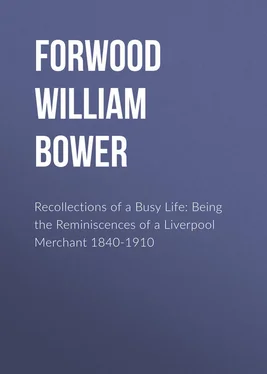William Forwood - Recollections of a Busy Life - Being the Reminiscences of a Liverpool Merchant 1840-1910
Здесь есть возможность читать онлайн «William Forwood - Recollections of a Busy Life - Being the Reminiscences of a Liverpool Merchant 1840-1910» — ознакомительный отрывок электронной книги совершенно бесплатно, а после прочтения отрывка купить полную версию. В некоторых случаях можно слушать аудио, скачать через торрент в формате fb2 и присутствует краткое содержание. Жанр: foreign_antique, foreign_prose, на английском языке. Описание произведения, (предисловие) а так же отзывы посетителей доступны на портале библиотеки ЛибКат.
- Название:Recollections of a Busy Life: Being the Reminiscences of a Liverpool Merchant 1840-1910
- Автор:
- Жанр:
- Год:неизвестен
- ISBN:нет данных
- Рейтинг книги:4 / 5. Голосов: 1
-
Избранное:Добавить в избранное
- Отзывы:
-
Ваша оценка:
- 80
- 1
- 2
- 3
- 4
- 5
Recollections of a Busy Life: Being the Reminiscences of a Liverpool Merchant 1840-1910: краткое содержание, описание и аннотация
Предлагаем к чтению аннотацию, описание, краткое содержание или предисловие (зависит от того, что написал сам автор книги «Recollections of a Busy Life: Being the Reminiscences of a Liverpool Merchant 1840-1910»). Если вы не нашли необходимую информацию о книге — напишите в комментариях, мы постараемся отыскать её.
Recollections of a Busy Life: Being the Reminiscences of a Liverpool Merchant 1840-1910 — читать онлайн ознакомительный отрывок
Ниже представлен текст книги, разбитый по страницам. Система сохранения места последней прочитанной страницы, позволяет с удобством читать онлайн бесплатно книгу «Recollections of a Busy Life: Being the Reminiscences of a Liverpool Merchant 1840-1910», без необходимости каждый раз заново искать на чём Вы остановились. Поставьте закладку, и сможете в любой момент перейти на страницу, на которой закончили чтение.
Интервал:
Закладка:
The river Mersey, at all times beautiful with its wonderful alternations of light and its brisk flowing waters, has never been so beautiful since the old sailing ship days, when at the top of high water the outward bound fleet proceeded to sea, and the entire river from the Pier Head to the Rock Light was filled with shipping of all sizes working their way out to sea, tacking and cross tacking, the clipper with her taut spars and snow-white canvas, and the small coaster with her tanned sails all went to make up a picture of wonderful colour and infinite beauty.
The Dock Board
There is no branch of the public service of which Liverpool people are more proud than the administration of the Mersey Docks and Harbour Board. The members of the Board have always been recruited from our leading merchants, shipowners, and brokers, and they have been fortunate in selecting as their chairmen men of exceptional ability. I can recollect Charles Turner, M.P., Robert Rankin, William Langton, Ralph Brocklebank, T. D. Hornby, Alfred Holt, John Brancker; and the Board is to-day presided over by Mr. Robert Gladstone, who worthily maintains the best traditions of his office.
Of late years the members have been elected without any contests, but it was not always so. In the 'seventies there were severe contests, which arose not upon questions of personal fitness, but were prompted by trade rivalries. It had become the fashion for the various trades to nominate members who would look after the particular interests of their trade. Jealousy was aroused if one trade obtained larger representation than others. The interests of the steamship owners were opposed to those of the sailing-ship owner. The one wanted allotted berths to secure dispatch, the other quay space free and unappropriated. Cotton men wanted special facilities for cotton, and the timber people yard space for the storage of timber and deals. Each trade had its associations, and in addition there was a ratepayers' association, which sought to break up this system of trade delegation by electing independent men. The payment of £10 in dock dues gave a vote. So faggot votes were easily and extensively manufactured. Shipowners and merchants qualified every clerk in their employ. The nomination of members took place on the 1st January, and the election on the day following. The elections were hotly contested, but always in a gentlemanly way, and with much good humour. It required skill to fill up the voting papers so as to secure a majority for any particular candidate.
Among those who busied themselves over these elections I remember William Johnston, Robert Coltart, Worsley Battersby, Edmund Taylor, Arthur Forwood, G. B. Thomson, George Cunliffe, and James Barnes.
The ratepayers' association accomplished much good by the election of some men of independence. My particular desire at this time was to try and induce the Board to fund their debt. It was felt that such a large floating debt was not only cumbrous and inconvenient, but in times of financial stress, or with a cycle of years of bad trade, might be a source of danger. I urged the funding of the debt on the nomination days, and also through the press and Chamber of Commerce. It met with the strong opposition of the Board, led by Mr. Brocklebank, but in course of time after the Corporation had taken the lead, the Dock Board wisely funded a portion of their debt.
The gradual increase of steamers, the passing of the sailing vessel, and the large share of the trade of the port being now conducted by "liners," have to a very large extent done away with trade rivalries; hence the little interest now taken in the Dock Board elections.
The present generation scarcely know that the docks were up to 1857 administered by a Committee of the Corporation. In my young days Liverpool people were very sore and angry at the action of Parliament in foisting upon them the Birkenhead docks. These docks had been constructed by a private company, and were insolvent and a hopeless failure. Birkenhead had, however, powerful influence in Parliament, and stoutly opposed any extension of the Liverpool docks, contending that the Birkenhead docks had not had fair play, and could accommodate the surplus trade of Liverpool. In the end, in 1857, Liverpool was obliged to buy them for £1,143,000, and within a very few years had to expend upon them £3,859,041. This outlay has ever since been a serious burden upon Liverpool. Nor did the hostile action of Parliament stop here. The town dues were taken from Liverpool, and commuted for a payment of £1,500,000. The management of the dock estate was placed in the hands of the trustees, who are, except three, elected by the dock ratepayers.
In olden time the Dock Board had an annual excursion to inspect the lightships, to which they invited the whole of the Council. They were pleasant days, and it was supposed that the Mayor for the coming year was selected on these occasions. These excursions contributed to a good feeling between the Dock Board and the Corporation, which is so essential if we are to preserve the prosperity of the port. I sometimes think that our City Fathers apparently forget that our docks and our commerce are the life-blood of Liverpool.
Mr. John Bramley Moore's great work on the Dock Board was completed before my day, but he continued his interest in Liverpool to the last, and was present at the opening of the North Dock system in 1882, where I saw him. He used to tell how indefatigably he worked to secure the extension of the docks in a northerly direction, how he asked Lord Derby to present the Bootle shore to the Dock Board, urging that it would be greatly to the gain of the Derby family. Lord Derby replied that it would be very difficult to convince him of that, and that he had already refused £90,000 for it. Mr. Bramley Moore then offered if Lord Derby would transfer his foreshore rights the Dock Committee would raise all the back land by using it for the deposit of their spoil, which would, he thought, be an adequate compensation. The deal was closed on this basis, the Dock Committee secured two miles of river frontage, and the Derby family the site of the most important part of Bootle, and now forming one of the most valuable of their estates.
One of the first docks constructed on this newly-acquired land was the Bramley Moore, so named after the chairman.
No one can fail to acknowledge the enterprise and wisdom which have characterised the administration of the dock estate. Municipal work follows the demand of the people, and seldom goes ahead of it; but the provision of docks must anticipate the demand likely to be experienced. In all this the Dock Board has acted with boldness and with prudence, under circumstances of much embarassment. The construction of the Manchester Ship Canal presented a problem of considerable difficulty, but the Dock Board adopted the courageous but wise policy of looking to Liverpool and Liverpool trade only, and the facilities they have provided for the changed conditions of trade have done not a little to conserve the commerce of the port.
The Liverpool Exchange
A great change has taken place in the Liverpool Exchange. In the early 'sixties the old Exchange buildings were still in existence. The building which surrounded Nelson's monument was classic in design, with high columns surmounted by Ionic capitals and a heavy cornice. The newsroom was in the east wing, with windows overlooking on the one side Exchange Street East, and on the other the "flags." The room had two rows of lofty pillars supporting the ceiling; and there was ample room in the various bays not only for newspaper stands, but for chairs and tables, and it had very much more the appearance of a reading-room in a club than its elaborate, but less comfortable successor. On the western and northern side of the Exchange were offices with warehouses overhead. The Borough Bridewell stood in High Street, its site being now covered by Brown's Buildings, and the Sessions House occupied part of the site upon which the newsroom now stands. In the 'sixties high 'change was in the afternoon between four and five o'clock, but much business was also transacted during the morning. No merchant or broker considered that he could commence the work of the day until he had read the news on the "pillars" in the newsroom. Instead of the work on the Exchange being done by clerks, it was transacted by the principals, who considered it only respectful to appear in a tall hat and frock coat. Although in those days there may have been a little too much formality in dress, in these there is sadly too little, and with the disappearance of the tall hat and frock coat one has also to regret the abandonment of those courtly manners and that respectful consideration which gave a charm to commercial intercourse, and was not confined to the Exchange and the office, but was reflected in the home and in private life.
Читать дальшеИнтервал:
Закладка:
Похожие книги на «Recollections of a Busy Life: Being the Reminiscences of a Liverpool Merchant 1840-1910»
Представляем Вашему вниманию похожие книги на «Recollections of a Busy Life: Being the Reminiscences of a Liverpool Merchant 1840-1910» списком для выбора. Мы отобрали схожую по названию и смыслу литературу в надежде предоставить читателям больше вариантов отыскать новые, интересные, ещё непрочитанные произведения.
Обсуждение, отзывы о книге «Recollections of a Busy Life: Being the Reminiscences of a Liverpool Merchant 1840-1910» и просто собственные мнения читателей. Оставьте ваши комментарии, напишите, что Вы думаете о произведении, его смысле или главных героях. Укажите что конкретно понравилось, а что нет, и почему Вы так считаете.








![William Frith - John Leech, His Life and Work. Vol. 1 [of 2]](/books/747171/william-frith-john-leech-his-life-and-work-vol-thumb.webp)

![William Frith - John Leech, His Life and Work, Vol. 2 [of 2]](/books/748201/william-frith-john-leech-his-life-and-work-vol-thumb.webp)

